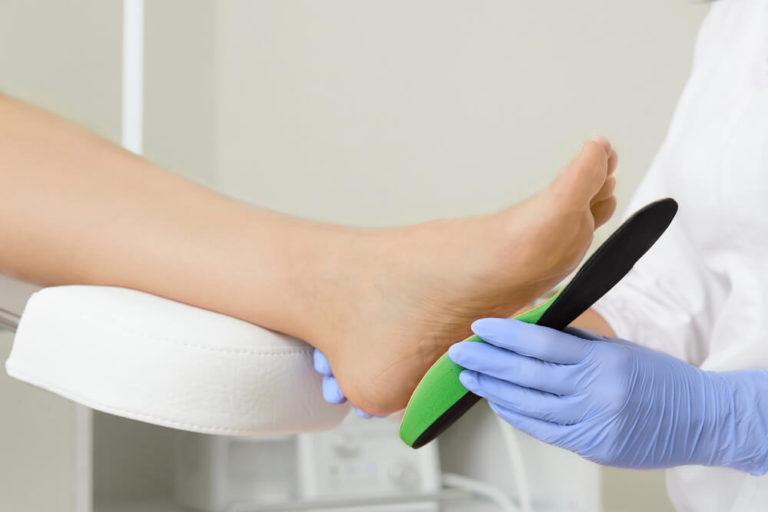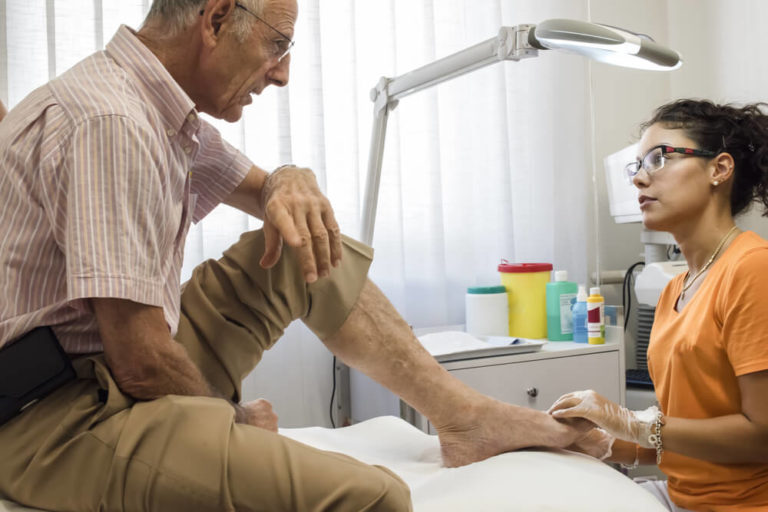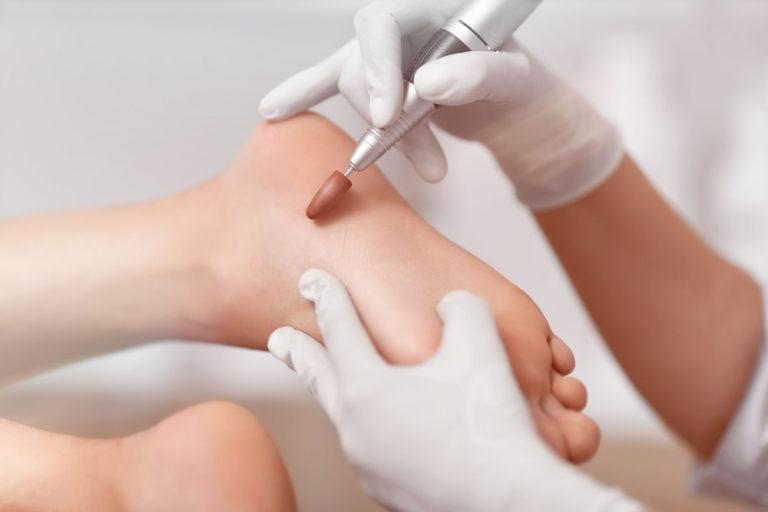A Chiropodist is a primary health care provider. They focus on the diagnosis, treatment, and prevention of foot dysfunctions. A chiropodist is concerned with illnesses and diseases related to foot health. Besides, chiropodists have experience in the therapy of acute and chronic foot disorders. Hence, they are a vital member of the multidisciplinary health care team.

Some examples of treatments Chiropodists offer are:
- Diabetic foot care,
- Sports and traumatic injuries,
- Biomechanical assessments and orthotic therapy,
- Paediatric foot disorders
- Wound care
Consultations with a chiropodist in private practice do not require a referral. As part of the healthcare team, chiropodists frequently collaborate with other medical specialists. Moreover, they can help with sports-related problems.
Consequently, many chiropodists can analyse how you walk or run. They can predict and evaluate whether the movement is causing difficulties in your feet or lower limbs. They can supply orthotics. Orthotics are shoe cushioning and insoles.
Additionally, a podiatrist provides workouts, acupuncture, and general footwear guidance. The professionals can also offer footwear recommendations. Furthermore, they might perform a primary MOT on your feet. MOT stands for measurements, observations and tests. They do it to ensure your feet are properly cared for.
Where Do Podiatrists & Chiropodists Get Paid the Most?
At NHS, the practice of podiatry and chiropody may pay you an average of £30,000 per annum. Band 7 salary is around £45,000 for higher-ups. Team leaders and advanced podiatry and chiropody practitioners may be subject to the facilities of band 7.
However, you might get paid the most if you have your own clinic setup. This is because your income can significantly increase if you own a multi-site private practice. Experienced private practitioners earn around £150,000 to £1,000 000.
How Much Does a Private Podiatry Visit Cost?
Private podiatry and chiropody clinics are dispersed throughout the country. The cost of private podiatry can vary, depending upon a lot of factors. Moreover, a podiatrist’s years of experience could make the fees go higher.
The average cost of a new patient assessment in the United Kingdom is between £55 and £80. Consequently, the fees vary depending on geographic location and facility. This fee usually entails a consultation.
If suitable or feasible at the time, it might also entail treatment. Many specialist therapies may necessitate additional evaluations and visits. For additional or follow-up appointments, they will invoice you at a discounted cost.

Furthermore, podiatrists also treat musculoskeletal (MSK) disorders. They do the procedures in different appointment types at most podiatrist clinics. MSK disorders are conditions affecting the bones, joints and soft tissues.
The cost of an appointment varies widely from clinic to clinic. The UK average for an MSK examination appears to be between £100-200. It usually includes gait analysis as well. However, prices for follow-ups or current patients are typically lower.
Consequently, removing or treating an ingrowing toenail as a surgical surgery is available. The clinic will charge you depending upon the nature of the operation. Moreover, the number of treated toes will be taken into account. These expenditures further include post-operative checkups.
Who Should Visit A Chiropodist?
Diabetes patients are at a higher risk of getting foot problems. Over time, high blood glucose levels can cause nerve injury and poor blood circulation. Consequently, infections, ulcers, sores, and toe abnormalities can result from one of these conditions.
Moreover, minor foot problems might quickly escalate into significant difficulties when you have diabetes. These issues, if left unaddressed, can lead to hospitalisation. The situation might escalate into possible amputation of the foot or limb.

If you have diabetes, it’s critical to see a chiropodist on a regular basis. At least once a year, get a foot exam. Furthermore, whenever you have a sore, ulcer, injury, or pain, see a chiropodist.
Another aspect that has an impact on our feet is our age. Our feet can become more problematic as we age. Increased strain on bones and ligaments are all contributory factors. In addition, tendons becoming weaker and inflexible, and age-related illnesses like arthritis are also crucial to treat readily.
However, regular visits to a chiropodist save you from the crisis. Because chiropodists swiftly identify and treat the problems. And they ensure your feet remain as healthy as possible.
Even if your feet appear to be in good health, seeing a chiropodist for frequent foot checks can be beneficial. Many people go years without knowing they have a foot problem that may have been treated earlier.
Can I Get Podiatric Care On The NHS?
You might be able to get free podiatry and chiropody healthcare from the NHS. Clinical commissioning groups (CCG) were granted the authority in April 2013. They could pick which foot care services to commission for their local area.

Foot care treatments for long-term illnesses should be accessible on the NHS. Conditions include diabetes, peripheral artery disease, and rheumatoid arthritis. National Institute for Health and Care Excellence (NICE) gave approval for the new regulations.
However, NICE has no recommendation for foot health care that isn’t linked to a chronic illness. This means that, depending on local needs, each CCG will decide what to make available on the NHS. For example, you might have a disease that isn’t hurting your health or mobility. In that case, you are likely to be ineligible for NHS podiatry.


![]() 11 minutes
11 minutes


![]() 11 minutes
11 minutes